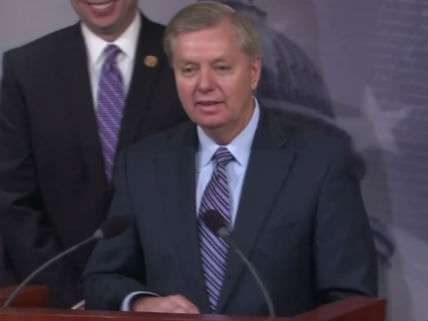The Tortured Textualism and Faux Federalism of the Chaffetz-Graham-Adelson Online Gambling Ban

As Scott Shackford anticipated a couple of weeks ago, Rep. Jason Chaffetz (R-Utah) and Sen. Lindsey Graham (R-S.C.) recently introduced a bill that would rewrite the Wire Act of 1961 to prohibit "any bet or wager" placed via the Internet. Chaffetz and Graham, who were recruited by casino magnate and GOP mega-donor Sheldon Adelson to help squash his online competitors, call the bill the Restoration of America's Wire Act. I think they (or Adelson's lobbyist, who co-wrote the bill) meant to say the Restoration of America's Wire Act Act, since the bill aims to "restore the long-standing interpretation of the Wire Act."
The problem, as the Justice Department finally recognized in December 2011, is that the interpretation Adelson and his pet legislators prefer is plainly at odds with the text of the statute, which refers to "bets or wagers on any sporting event or contest"—language that the Chaffetz-Graham-Adelson bill, H.R. 4301, would excise. Furthermore, since the Wire Act was passed decades before the Internet existed, it is rather problematic to say that Congress intended to ban online gambling. H.R. 4301 addresses that difficulty with new language referring to "any transmission over the Internet carried interstate or in foreign commerce, incidentally or otherwise." The bill does not "restore" anything; it imposes a brand new ban on Internet gambling. That includes online poker, which undeniably involves betting even if you consider it mainly a game of skill.
Graham claims admitting that the Wire Act applies only to sports betting—a conclusion endorsed by the U.S. Court of Appeals Court for the 5th Circuit back in 2002—is "yet another example of the Holder Justice Department and Obama Administration ignoring the law." If you pay close attention to a statute's actual words, according to Graham, you are ignoring the law. Being true to the law evidently requires excising the inconvenient parts.
Equally risible is Graham's claim that his legislation, which would block moves toward legalizing online gambling in states such as Nevada and New Jersey, is necessary to protect state autonomy:
In 1999, South Carolina outlawed video poker and removed over 33,000 video poker machines from within its borders. Now, because of the Obama Administration's decision, virtually any cell phone or computer can again become a video poker machine. It's simply not right.
Texas Gov. Rick Perry, quoted in the press release announcing the bill, endorses this argument:
When gambling occurs in the virtual world, the ability of states to determine whether the activity should be available to its citizens and under what conditions—and to control the activity accordingly—is left subject to the vagaries of the technological marketplace. This seriously compromises the ability of states to control gambling within their borders.
Since Perry is known as a 10th Amendment enthusiast, his support for the bill may carry weight among federalists. It shouldn't. Contrary to Perry's implication, H.R. 4301 would not let states decide whether Internet gambling is permitted within their borders. It would ban online gambling throughout the country, even in states that want to allow it. This is a strange sort of federalism.


Show Comments (18)